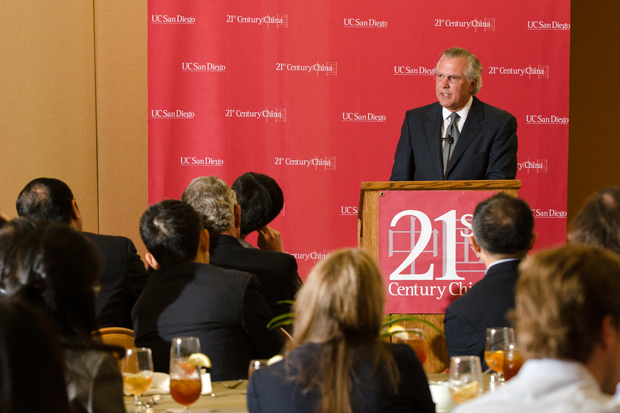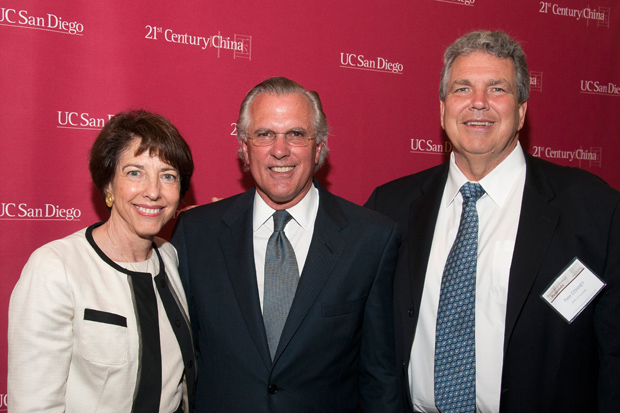
By:
- Christine Clark
Published Date
By:
- Christine Clark
Share This:
Future Direction of Chinese Currency Debated at Sold-out UC San Diego Conference

Jobs, economic growth, currency markets and other pressing economic issues were at the center of UC San Diego’s Internationalization of Renminbi Conference held June 7 to 8. The event was the first major international conference devoted to comprehensive discussions on internationalizing China’s currency.
China’s economy is growing rapidly, but Chinese currency has yet to join the ranks of the U.S. dollar, euro, yen and sterling pound to become a global reserve currency.
“Today’s topic comes at a dramatic moment in China’s history,” said Peter Cowhey, dean of UC San Diego’s School of International Relations and Pacific Studies during the conference’s welcome reception. “It’s a dynamic time in finance and currency markets. We’re looking at questions such as ‘should the average citizen be concerned about trade currency’ and ‘how do we get our financial markets to work more efficiently?’”
The two-day event was hosted by the 21st Century China program at IR/PS. It featured distinguished speakers from People’s Bank of China, the International Monetary Fund, Deutsche Bank, Hong Kong Monetary Authority and the Dallas Federal Reserve.
Richard Fisher, CEO of the Dallas Federal Reserve, delivered a keynote speech Thursday in which he said U.S. lawmakers must bring federal spending more in line with revenue as Chinese currency one day may rival the dollar’s dominant role.
“We face a very real risk of having formidable competitors to the dollar in the sweepstakes for sovereign investment,” Fisher said. “As Chinese policy makers lay the groundwork for the continued internationalization of the renminbi, our nation’s fiscal authorities must bear in mind that there may one day be viable alternatives to the dollar and U.S. Treasury debt.”

The most pressing challenge confronting China is reforming its domestic financial sector by permitting competition from the private sector and allowing the market to determine asset prices such as interest rates, he said.
“Lessons and warnings from other emerging economies, whose lack of financial sector efficiency and transparency keeps them mired in the middle-income trap, are well known,” he said. “China’s economic miracle may face the same pitfall if it does not reform its financial sector.”
Fisher went on to acknowledge the steps China has taken to reform its banks, including a recent decision by the China Banking Regulatory Commission to relax some restrictions for private investors to participate in the banking sector.
“I was pleased to see such changes and hope China’s policymakers follow up with additional reforms to encourage transparency and fair competition in the banking sector,” he said.
Fisher closed by saying a few remarks on what the implications are for the U.S. as China’s currency internationalizes. He said if the U.S. wants the dollar to continue to be the dominant international currency, more fiscal responsibility is needed.
“Today, more than 80 percent of all global commercial foreign-exchange trades involve the dollar on at least one side of a transaction” Fisher said. “…The privileges that status affords us will only be preserved if our fiscal authorities learn to budget responsibly,” Fisher said. They must do so in a manner that provides our engine of economic prosperity—the private sector—with incentives to adapt and expand our economy, which in turn, anchors global confidence in America.”
Registration was full for the Internationalization of Renminbi Conference. The event was attended by representatives from companies doing business in China, economists, academic leaders, policy experts and government officials.
The conference is one of a series of events hosted by the 21st Century China program at IR/PS. The program serves as a hub of the San Diego and Southern California community for interactive and scholarly engagement with China. The program’s mission is to deepen public knowledge about China, catalyze cutting-edge research on public policy issues involving China and to promote active discourse on China’s domestic evolution and its emergence as a global power.
For more information on UC San Diego’s 21st Century China program, go to china.ucsd.edu.
Share This:
You May Also Like
Stay in the Know
Keep up with all the latest from UC San Diego. Subscribe to the newsletter today.


